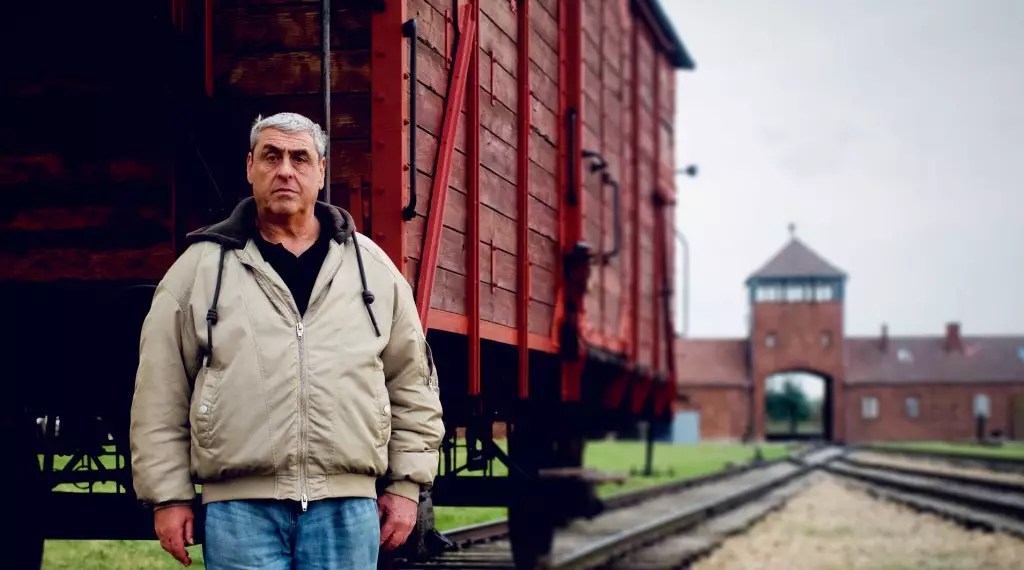In a world increasingly defined by the narratives we choose to tell, the upcoming documentary film, *The Tattooist’s Son: Journey to Auschwitz*, emerges as both a poignant exploration of personal history and a vital communicative tool for understanding the Holocaust’s lasting impact. Produced as a follow-up to the acclaimed drama series based on Heather Morris’s bestselling novel, this documentary takes us through an emotional odyssey led by Gary Sokolov, the sole descendant of Holocaust survivors Lali and Gita Sokolov.
Scheduled for release in January to coincide with the 80th anniversary of Auschwitz’s liberation, this 90-minute film aims to traverse geographical and emotional landscapes. Filming took place in various locations including Melbourne, Slovakia, and Poland, underscoring the global dimension of the Holocaust narrative while emphasizing the personal roots that lie at its core.
Gary’s journey is particularly compelling as it frames the experiences of his parents—whose love blossomed amid the horrors of Auschwitz—through the lens of their son’s quest for knowledge. Although the dramatized version of their story captivated audiences and was translated into multiple languages worldwide, Gary himself was largely kept in the dark about his parents’ formidable past. This intriguing contrast raises significant questions about familial narratives and the complexities of intergenerational trauma.
The documentary fuses contemporary interviews with historical context, offering viewers a rich tapestry of insights. Gary will not only visit key sites associated with his parents’ experiences but will also engage in dialogues with Heather Morris, the author, as well as actors Jonah Hauer-King and Anna Próchniak, who portrayed Lali and Gita. This blend of old and new footage—including clips from the drama series and archival materials—infuses the project with authenticity and a sense of urgency, inviting viewers to reconsider what they know about the Holocaust.
One of the most compelling aspects that this documentary seeks to unravel is the silence surrounding trauma. It is an intimate yet universal experience, as families often choose to shield their children from painful pasts. Gary’s undertaking presents a significant opportunity to break this cycle of silence, exploring how trauma can echo through generations. As he embarks on this voyage, viewers may reflect on their own familial narratives, pondering what stories remain untold within their circles.
The emotional weight of the documentary is underscored by the involvement of Claire Mundell’s Synchronicity Films, noted for its depth and sensitivity in storytelling. Mundell indicates that Gary’s attendance at the drama series launch played a pivotal role in inspiring this documentary. His personal association with a narrative that has gained widespread emotional resonance imbues the documentary with unique significance and authenticity.
As a production co-produced by Hearst Networks EMEA and Sky, *The Tattooist’s Son* aligns itself with a larger narrative—one that emphasizes the importance of commemorating the events of the Holocaust. Dan Korn, VP of Programming at Hearst Networks, mentions the need to explore intergenerational trauma, framing Gary’s story not just as a relic of the past but a critical reflection of how that past continues to influence current generations.
The documentary echoes a broader responsibility to remember and educate, a sentiment echoed in related projects such as *Chernobyl: The Lost Tapes*. By translating historical events into relatable experiences, these documentaries can foster dialogue and understanding, pushing against the boundaries of forgetfulness and indifference.
In capturing Gary’s pilgrimage to Auschwitz, *The Tattooist’s Son: Journey to Auschwitz* not only memorializes Lali and Gita Sokolov’s enduring love but also serves as a vital call to action. Viewers are invited to reexamine their personal histories, confront the silences that may reside within their families, and ultimately contribute to the collective memory of humanity. A deep awareness of our past is crucial, as it informs our present actions and choices in an increasingly fragmented world. This documentary stands as a testament that history, when shared and understood, has the power to heal.


Leave a Reply